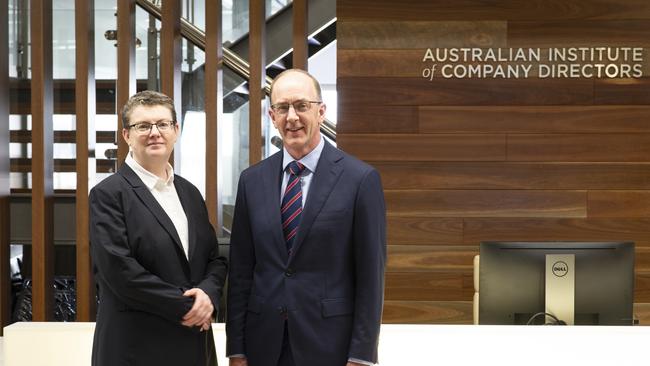AICD warns new climate change reporting too tough for small business
Proposed mandatory climate change disclosure laws will apply to major emitters and companies with $1bn in assets, but will extend to smaller companies too, the AICD warns.

Proposed new laws on mandatory climate change disclosure could prove too harsh for small businesses, the Australian Institute of Company Directors has warned.
AICD general manager, education and policy leadership, Louise Petschler, said the group welcomed the introduction of mandatory climate change reporting, which comes into force next financial year for larger companies, but is concerned that its extension to smaller companies in a few years’ time may prove too onerous.
Under current proposals being put forward by the government, the mandatory reporting laws on climate change will apply for major emitters and companies with more than $1bn in assets, $500m in consolidated revenue or 500 employees, from next financial year.
But they will extend to companies with only $25m in consolidated assets, $50m in annual revenue or 100 employees by the 2027-2028 financial year.
“We’re all pretty comfortable with the first cohort of companies which will be captured by the new legislation – the big companies and the heavy emitters,” Ms Petschler said in an interview with The Australian.
“But we are hoping that there can be a bit more of a transition period when it comes to smaller entities. We think it (the imposition of mandatory climate change reporting requirements on smaller companies) is probably a bit aggressive, particularly when you think about the requirements for Scope 3 reporting (on the carbon emissions of suppliers and customers). It’s definitely too aggressive for the Australian market.”
She said the government would be better off focusing on imposing the mandatory reporting requirements on larger companies, as they were more likely to be larger emitters.

While the details of the proposed law have not been finalised, they are expected to include the requirement for companies to disclose details on the current and anticipated effects of climate change on the company over the short, medium and long term.
This will include using different climate change scenarios to assess potential risks facing the company and details of the company’s plans to deal with potential climate change risks.
Reporting requirements are expected to include mandatory reporting of the total carbon emissions by the company, starting with Scope 1 and 2 emissions. with reporting on Scope 3 emissions coming in later.
She said the AICD believed that smaller companies should have a longer transition period for mandatory reporting or have simplified reporting requirements.
Ms Petschler was speaking on the release of the AICD’s new guidebook for directors on the new mandatory climate change reporting requirements.
She said the new reporting requirements would represent a significant step up in requirements for companies – even those already making disclosures under internationally accepted frameworks such as the Task Force on Climate Related Financial Disclosures (TCFD).
“The shift to climate-related disclosures represents the biggest change to corporate reporting in a generation,” she said.
“Integrating climate disclosures into financial reporting needs to be carefully managed.
“It will require focus on upskilling boards, organisations and the economy as a whole.”
“Many Australian companies are doing climate reporting, especially the larger ones, but this will be a step up for everyone.”
The AICD’s new 73-page mandatory climate reporting guide for company directors has been prepared with accounting firm Deloitte and law firm MinterEllison.
Ms Petschler said all companies potentially affected by the new laws needed to start preparing for the new requirements.

The new mandatory reporting requirements are being rolled out in three stages expanding progressively to smaller companies.
They will apply to companies with at least 250 staff, more than $500m in consolidated assets or $200m in total revenue from the 2026-27 financial year and smaller businesses the year after.
“Everyone from the boardroom down needs to be across what the requirements are and to be thinking about how they’re going to adjust their corporate reporting,” she said.
She said many company directors were already starting to educate themselves on the new mandatory reporting regime, with more than 2000 attending a recent climate change conference hosted by the AICD.
Ms Petschler said the AICD supported the federal government’s proposal for the Australian Securities & Investments Commission (ASIC) to handle the enforcement of the legislation in its first three years of operation.
She said this would allow ASIC to “set the tone” for the reporting standards before directors were subject to potential class actions over the new laws.
She said the introduction of mandatory reporting on climate change had the potential to become a “lawyers’ picnic” if potential class actions were allowed in the first few years of operation.
“Remaining profitable and competitive in a decarbonising economy is a key strategic challenge and opportunity for Australian business,” AICD managing director Mark Rigotti said. “This generational shift in corporate reporting will require leadership and focus from the boardroom down.”
Deloitte Australia climate governance lead Rebekah Cheney said boards needed to “think holistically about where climate-related risks and opportunities lay and how to measure and manage them.”
“It’s no longer enough to simply leave climate with sustainability teams,” she said.
MinterEllison partner and head of climate and sustainability risk governance, Sarah Barker, said external scrutiny on companies had never been higher.
“Directors will need to get comfortable signing off on complex disclosures,” she said.
“Climate targets should be realistic and supported by an evidence-based transition plan.”







To join the conversation, please log in. Don't have an account? Register
Join the conversation, you are commenting as Logout